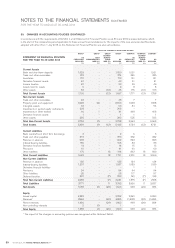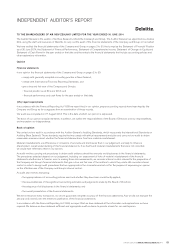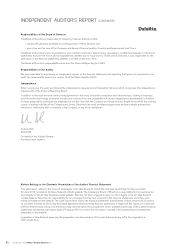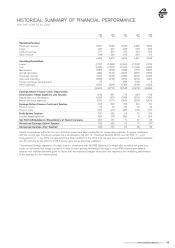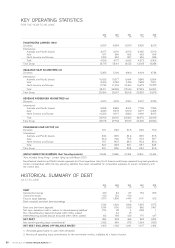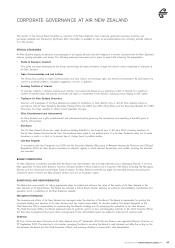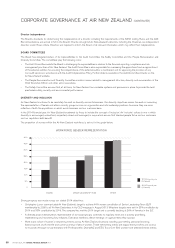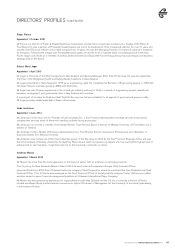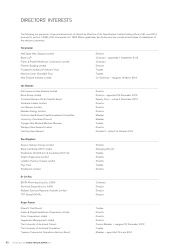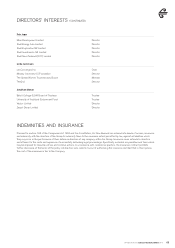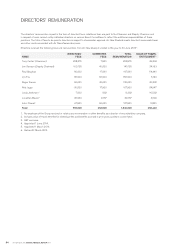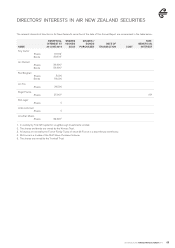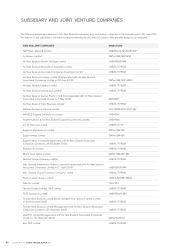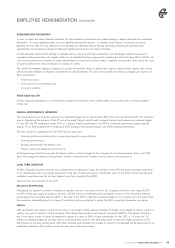Air New Zealand 2014 Annual Report Download - page 61
Download and view the complete annual report
Please find page 61 of the 2014 Air New Zealand annual report below. You can navigate through the pages in the report by either clicking on the pages listed below, or by using the keyword search tool below to find specific information within the annual report.
A support and buddy programme to facilitate the retention of women returning from parental leave has been developed and rolled out.
Accelerated development of women identified as having potential to progress to more senior roles has been initiated with participation
in leadership development centres, targeted development plans and access to coaches and mentors within the business.
Regular auditing of performance and reward processes for unconscious bias to identify any gender disparity has been put in place.
The overall distribution of performance ratings is materially the same for males and females.
Unconscious bias training has been rolled out to the majority of SLT members and their direct reports. This also included the
opportunity to take a series of unconscious bias tests online. Other groups who received training included all of HR, Hiring Managers
during Recruitment Excellence Training and other parts of the organisation where this was requested, including Crew and Airport teams.
New recruits to Air New Zealand continue to be asked a range of diversity information enabling the building of a database of the
diversity of our employees.
Cultural celebration programmes to increase cultural awareness were rolled out across the 2014 financial year including Matariki, Diwali,
Chinese New Year, Polyfest, International Women’s Day and National Sign Language week.
Looking to the 2015 financial year, a programme of work has been committed to which includes continuing making progress on the
initiatives commenced in the 2014 financial year and in addition:
• ImplementingadiversityandinclusionelementintotheemployeeengagementsurveytobeintroducedintoAirNewZealandin
November 2014;
• DevelopmentofethnicitytargetsforSLTconstitution;
• Leverageandwidenoutparticipationinunconsciousbiastrainingtosupportthegenderandethnicitytargets;and
• Expandthescopeofculturalcelebrationprogrammes.
REPORTINGANDDISCLOSURE
Air New Zealand has written policies and procedures in place to keep investors and staff informed of all material information about
Air New Zealand and to ensure compliance with disclosure requirements under legislation and stock exchange listing rules. Board and
Committee charters and policies of public relevance are published on Air New Zealand’s web site at www.airnzinvestor.com.
REMUNERATIONANDPERFORMANCE EVALUATION
Executives
Air New Zealand’s performance management system applies to the executive management group. The focus is on establishing goals,
measures and targets linked directly to the business plan and to the leadership behaviours needed to achieve business success.
Air New Zealand’s remuneration policies and practices are linked directly to the performance and development processes so that
executive managers’ achievement of Air New Zealand’s goals is appropriately recognised and rewarded.
Non-executive Directors
Air New Zealand’s non-executive directors do not participate in any executive remuneration scheme or employee share schemes; nor do
they receive options, bonus payments or any incentive-based remuneration. Directors are entitled to be reimbursed by Air New Zealand for
reasonable travelling, accommodation and other expenses they may incur whilst travelling to or from meetings of the directors or committees.
Board Evaluation
The Board has included in its Charter a requirement to conduct an annual performance review of the Board as a whole after
the financial year end. Individual director views and the views of members of the senior management team are sought on Board
process, efficiency, and effectiveness and are discussed by the Board as a whole. In conjunction with this process, those directors
retiring annually by rotation who are standing for re-election have their performance evaluated by their fellow directors in a process
co-ordinated by the Chairman, with individual feedback to each director as their evaluation is completed.
DIFFERENCES IN PRACTICE TO NZX CODE AND ASX RECOMMENDATIONS
Under the NZSX and ASX Listing Rules, Air New Zealand is required to disclose in this annual report the extent to which its corporate
governance practices materially differ from the principles set out in the NZX Code and the ASX Recommendations. A summary of
Air New Zealand’s corporate governance practices have been provided above. Any divergence from the NZX Code and the ASX
Recommendations is explained in the table below.
ASX Corporate Governance Principles
and Recommendations
NZX Corporate Governance Best
PracticeCode
Reason for not following
2.1 The board should establish a
nomination committee.
2.2 Unless constrained by size, an
Issuer should establish a nomination
committee as recommended below in
paragraph 3.11.
3.11 – 3.13 Composition, charter and
review of nomination committee.
The Board believes that a nomination
committee is not required for
Air New Zealand, as its whole Board
should be (and is) involved in the
selection and appointment process of
any new Board members.
CORPORATE GOVERNANCE AT AIR NEW ZEALAND (CONTINUED)
AIR NEW ZEALAND ANNUAL FINANCIAL REVIEW 2014 59



